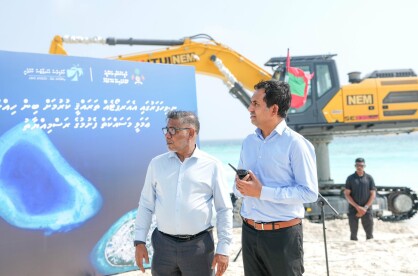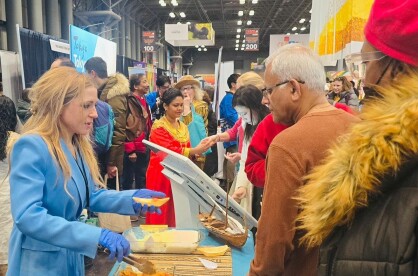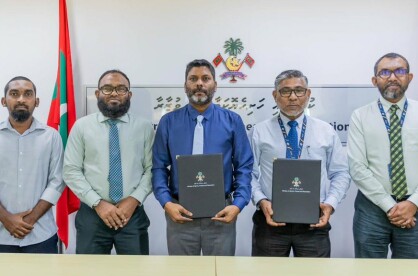Local talent in the tourism industry
With the Maldives celebrating 50 years of tourism, there needs to be major change in laws, and policies, to develop local talent.

Unsplash | CHUTTERSNAP
With the Maldives celebrating 50 years of tourism, there needs to be major change in laws, and policies, to develop local talent.

Unsplash | CHUTTERSNAP
In 1972, with the opening of the first resort, Kurumba Maldives, the industry took over navigation of the country’s economy. The industry came to a grounding halt in 2020, with border closures and decline in international travel, as the COVID-19 pandemic ravaged its way across the world. The Maldives now, however, is on the cautious cusp of a fragile recovery. Statistics issued by the Maldives Bureau of Statistics (MBS) shows that 143,599 tourists had visited the Maldives in August 2021, an increase of 41 percent compared to the previous month. Total bed nights in August 2021 were at 974,618, an increase of 30 percent compared to July. All these are promising signs.
The MBS, in a mid-2019 survey of all tourism resorts in the Maldives, showed that a total of 44,954 employees are on the payroll of 147 tourist resorts, with local employees accounting for 47 percent. Female employees however, accounted for only 10 percent of total employees, of which a mere 3 percent were locals. Of the total employees, 2,615 reported that they commuted to work daily.
In early 2020, 48,664 employees were on the payroll of resorts, an increase of 8 percent between the 9-month period from April 2019 to January 2020. With border closures between March to July 2020, a large number of employees were laid off or put on indefinite leave or leave without pay, and it was reported that in June 2020, resorts employed only 4,713 staff. This number increased to 35,887 by December 2020, with borders reopened in July 2020 and resorts coming back into operation.
Locals employed in the sector, however, declined by 5 percent to 42 percent in 2020, compared to the 47 percent registered in 2019.
According to the Resort Employment Survey carried out in 2020, service workers account for the major employee category within the industry, at 29 percent, and professional and managerial levels account for 23 percent of employment. Foreign employees dominate the professional level at a staggering 74 percent, followed by elementary occupations, where 56 percent are foreign workers. Within the service worker category, including professions such as technicians, housekeepers, butlers, drivers, front desk officers, and diver instructors, employment is split down the middle between locals and foreigners.
The high proportion of foreign employment in the tourism sector is an area that needs focused attention, especially as the country embarks on celebrations in 2022 to mark 50 years since tourism was first introduced in the Maldives. Local Maldivians are still fighting to break the glass ceiling and enter the C-suite of resorts, and participation of local females in the industry is still at a mere 3 percent. The Resort Employment Survey in 2020 provides a tiny glimpse into the situation, where locals dominate entry level to supervisory positions and there is an overwhelming number of foreign talent in professional and managerial roles.
Some of the major causes noted for this disparity are:
Industry veterans, in an article published by Travel Trade Maldives in June 2020, discussed the issue of local versus foreign talent in the Maldives' tourism industry. While the responses were not level specific, they identified one of the major reasons for choosing foreigners over locals to be limited availability of locals who are skilled and experienced, especially in the fields of culinary, spa services and engineering. Due to the nature and requirements of the industry, an educational qualification is simply not enough. This places a mammoth emphasis on the need for increased number of well-trained locals on a continued growth and learning trajectory.
The Maldives is home to some of the world's leading luxury hotel chains. However, locals employed at executive levels at these hotels in the Maldives are relatively low. While it may be important to have some home country or HQ staff of international chains on the resorts, especially during the initial set up stages, the concern crops up when the temporary becomes permanent, and these levels are dominated by foreigners. Some industry professionals claim that this is at times due to the fallacy that Maldivians are not up to pay to lead properties falling under the umbrellas of large global brands. Another distressing claim is that of discrimination - that the properties choose talent from the home country even when there is local talent available.
For a country with such a highly specialized and niche tourism product, a good skills-focused hotel school is essential, in addition to educational qualifications at the undergraduate and graduate levels. This initiative requires investment in infrastructure and human resources for training, which could be undertaken in association with established institutions worldwide to provide internationally recognized qualifications and skills. The school should not just be focused on providing training in food and beverages, front office or housekeeping sectors, but also look at tailoring training for the needs of the industry.
This endeavor must begin from a young age and be instilled throughout education in schools. Developing skills required to function as a professional who is responsible, curios and open to learning is crucial, as is being assertive and having good people skills. This may require an overhaul of the country's current education system and education sector policy objectives.
Under the Tourism Act, the current local to foreign employment ratio stands at 45 to 55. Almost 5 decades into the industry, this is both concerning and disheartening to see. Resorts must have more locals so that the local talent pipeline for the executive level is rich. Furthermore, even though the targeted ratio of locals is 45 percent, the fact is that local employment at resorts is mostly below this threshold even now. This is the first and immediate change which should happen - to modify the ration to 50 – 50 and over time to at least 60 – 40. In August 2020, the Parliament’s Social Affairs Committee passed a new amendment to the Employment Act mandating that locals occupy at least 60 percent of senior management positions. With a proposed timeline of five years for implementation, such amendments are key to support and develop local employment in the industry.
The reality when international chains open up properties in Maldives is that the majority of the time, senior management positions go to foreign nationals. There is a balance to be struck here, with a good mix of local and foreign professionals in these roles. Having locals leading departments or some resorts, proves that they are talented, skilled, passionate and able to deliver successes, similar to their foreign counterparts.
Yes — diversity is important, especially for a service-oriented industry such as tourism and hospitality. However, 50 years in, the industry needs to be in a place where Maldivians grow from just being at entry level positions in F&B or Housekeeping. The Ministry of Tourism (MoT) needs to be more vigilant and take on a more proactive role in developing local talent. It must also work closely with other government agencies to ensure compliance of what is written in laws and policies.
Ultimately, as Hussain Afeef, Director of Talent Management and HR at LUX* Resorts Maldives said in the TTM article, strategies are required not just at individual or company levels, but a national level to drive these efforts to build local talent.



